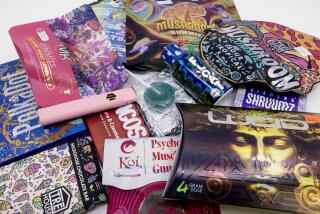RESTAURANTS : The Inescapable MSG Controversy
- Share via
Deep in the interior of Borneo, the glistening white cooking powder called ajinomoto is so highly prized that the natives use it as money. In Japan, ajinomoto flavors the soup stocks in almost every ramen shop, and in China, mei-jing, wei-jing or ve-tsin (depending on the region) adds zip to sauces and stir-fried dishes.
But here in the United States, many Americans regard the powder we know as monosodium glutamate (MSG) with suspicion and distrust. Headlines scream: “Fits of Depression, Rage Linked to Food Seasoning” and “MSG Might Harm Youth.” In Japanese and Chinese restaurants, patrons demand that their meals be prepared without MSG. Even the big guy on the Lakers, Kareem Abdul-Jabbar, has trouble handling MSG. He once told People magazine that he missed a game because of a migraine caused by a Chinese meal that was high in MSG.
But calling the headaches, numbness, heart palpitations and other symptoms claimed by the MSG-sensitive (or, MSGers, as one sufferer dubbed himself) the Chinese Restaurant Syndrome is a misnomer. MSG is in almost everything we eat.
“How many people know that all cans of tuna fish have MSG?” asked clinical researcher George Schwartz, author of “In Bad Taste: The MSG Syndrome,” and president of the Santa Fe-based International Assn. for the Study of MSG and Food Additives. “Even if people check labels, they might not know that MSG is also hiding in what is innocently called ‘natural flavoring.’ It’s in nacho cheese Doritos, Campbell’s soups, Hamburger Helper and almost every frozen dinner you can buy.
“I spoke to one Japanese chef,” Schwartz said, “and he told me, ‘You Americans just don’t know how to use the stuff.’ Then he showed me what he used and it was just a tiny pinch.”
That may be, but chef Kazuto Matsusaka of Chinois on Main says that he sometimes suffers from the effects of MSG, even though he grew up eating a MSG-rich diet. “I feel numb on the side of my cheeks and maybe my stomach doesn’t settle,” Matsusaka said. “The funny thing is, it didn’t bother me until after I’d been in the United States for a long time and went back to Japan for a visit. I think it’s an addiction. Some people don’t use it and then think there isn’t enough flavor. And of course my mother uses it when she makes pickles or miso soup. But I don’t tell her not to use it; I just eat it.”
PBS Chinese cooking show star Ken Hom is another Asian sufferer of what he calls an MSG allergy. “Chinese people have the same reactions as anyone else,” Hom said. “My mother never used it because it would make me break out and get dizzy. Just as some people are allergic to red wine, I’m allergic to MSG. I’m not as rabidly against it as some people, though I think that if you use good food, you don’t need to use it.”
Naturally, MSG has its defenders. The Glutamate Assn., an Atlanta-based trade association of glutamic acid manufacturers and marketers, is devoted to convincing America that MSG is not dangerous, merely the victim of bad publicity. The association, whose spokespeople and literature often repeat the slogan, “It makes good food taste better,” currently cites a study conducted in 1986 at the George Washington University School of Medicine and Health Sciences, which found that 66% of the study’s subjects who claimed to be MSG-sensitive showed no symptoms when given moderate doses of the substance in lab-controlled situations.
However, the Center for Science in the Public Interest is critical of the study. Bonnie Leibman, director of nutrition at the Center, points out that the George Washington study was funded by the Glutamate Assn. “It might be true that some people didn’t react to the MSG,” she said, “but there are a lot of people who do react.”
“There are a lot of other ingredients that people might be reacting to,” Julie Wilgus of the Glutamate Assn. said. “And who else is going to pay for the research? George Washington is a prestigious university. I’m sure they wouldn’t support a study that was unethical.”
The association also points out that the U.S. Food and Drug Administration puts MSG on its Generally Regarded As Safe list. The Federation of American Societies for Experimental Biology was contracted by the FDA to do a 10-year review and determined that there is no evidence to suspect any health hazards caused by normal usage of MSG. “However,” said Dr. Kenneth Fisher, the federation’s director of life sciences, “It’s not possible to determine if larger doses pose a safety risk.”
Author Schwartz isn’t persuaded by the FDA safety classification. He personally experienced vertigo, dizziness, double vision and thought he had a brain tumor until he discovered that MSG was causing his problems.
“And I’m a physician!” he said. Others doctors in his group cite cases in which patients have shown irritation, depression, headaches and general malaise. Most recently, Schwartz is publicizing an Australian study that shows moderate MSG doses bring on asthma attacks. He thinks there is a link between MSG and Alzheimer’s disease as well.
Schwartz draws the line, however, at the supposed link drawn by the widow of mass murderer James Huberty who sued McDonald’s because, she claimed, MSG used in the fast-food restaurant’s burgers helped spark Huberty’s violent outburst that left 21 people dead at a San Ysidro McDonald’s outlet.
“To blame a mass murder on MSG is going too far,” Schwartz said. (The case was summarily dismissed.) “At the same time, there are a lot of people who eat MSG and then become awfully unreasonable.”
More to Read
Eat your way across L.A.
Get our weekly Tasting Notes newsletter for reviews, news and more.
You may occasionally receive promotional content from the Los Angeles Times.











